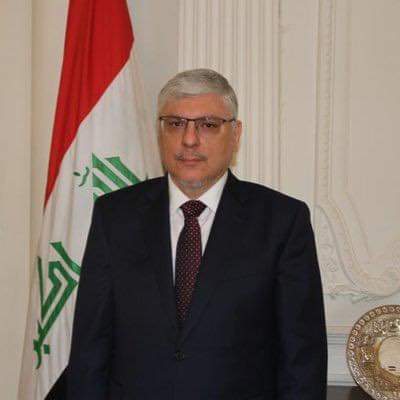Iraqi President Barham Salih expressed his support for the initiative of the leader of the Sadrist movement, Muqtada al-Sadr, and the forces of the "coordinating framework";
By agreeing to resolve the government formation crisis that has been going on for more than 4 months.
"We highly value the political initiative to overcome the state of obstruction and constitutional obstruction," Saleh said in a tweet.
"It is our duty to support national efforts to meet the constitutional obligations, and to initiate the formation of a capable government that protects national security and citizens," he added.
The Iraqi president's position comes after resolving the political crisis between the leader of the Sadrist movement, Muqtada al-Sadr, and the forces of the coordination framework, regarding the formation of the next government.
We highly value the political initiative to overcome the state of constitutional obstruction and obstruction.
Our duty is to support national efforts to meet the constitutional requirements and initiate the formation of a capable government that protects national security and serves citizens, responds to economic and living challenges and protects the country’s sovereignty and stability in light of international changes
— Barham Salih (@BarhamSalih) March 11, 2022
Al-Sadr, whose political alliance won the highest seats in parliament in the October elections (72 seats out of 329), made a phone call - the day before yesterday, Thursday - with the head of the Coordination Framework Forces and the head of the State of Law coalition, Nuri al-Maliki, and they discussed for the first time the government formation crisis.
It is noteworthy that Al-Sadr had previously stipulated that the coordinating framework forces be required to participate in the government that he intends to form, that Al-Maliki not be part of it.
Al-Sadr blames Al-Maliki, who headed the government in two successive terms (2006-2014), for the "spread of corruption and acts of violence" in the country, as well as the Islamic State's invasion of a third of Iraq in the summer of 2014.
The coordinating framework includes the State of Law coalition, the State Forces Alliance, the Victory Alliance, the Al-Fateh Alliance (the Popular Mobilization Factions, some of which are close to Iran), the Ataa Movement, and the Virtue Party.
After Muqtada al-Sadr's contact with Mr. Nuri al-Maliki and what was leaked about the meeting of the leaders of the coordination framework
, it became almost certain that Mr. Jaafar al-Sadr, Iraq's ambassador in London, is the next prime minister.
- Mishaan Al-Jubouri (@mashanaljabouri) March 11, 2022
For his part, Iraqi MP Mishaan al-Jubouri revealed, on Friday, that Baghdad's ambassador to Britain, Jaafar al-Sadr, is the most likely candidate to head the next government.
Al-Jubouri (a member of the Sovereignty Alliance - 71 seats) said - in a tweet via Twitter - that "after Muqtada al-Sadr's contact with al-Maliki and what was leaked about the meeting of the leaders of the coordination framework, it became almost certain that Jaafar al-Sadr is the next prime minister."
The Iraqi ambassador to Britain, Jaafar al-Sadr (communication sites)
Jaafar al-Sadr, who is Iraq's ambassador to Britain, is Muqtada al-Sadr's cousin.
The system of government in Iraq is parliamentary, where the legislative authority is concerned with electing officials of the executive authority. The Council of Representatives (Parliament) initially elects a speaker and two deputies, and then a president of the republic.
Later, the President of the Republic elected by Parliament assigns the candidate of the most numerous parliamentary bloc to form the new government, which must have the confidence of Parliament (329 deputies).
So far, Parliament has succeeded in electing its speaker, Muhammad al-Halbousi, and his two deputies, in its first session on the ninth of last January, and the major differences between the winning blocs prevented moving forward with the next step, which is the election of a new president.
There are many analyzes of what happened, perhaps the most important of which is the hidden pressures that the Sadrist movement was subjected to through the decisions of the Federal Supreme Court, which seem to have come in other than what al-Sadr wanted, the most important of which is obstructing the election of the President of the Republic more than once.
Another analysis is that Al-Sadr has come to see that the tripartite alliance, which includes his current and the Kurdistan Democratic and Sovereignty Alliance, is unstable, especially with the odds that major differences are engulfing the Sovereignty Alliance.
Another matter is represented in the Federal Court’s decision from the Oil and Gas Law in the Kurdistan Region, which was issued last month and obligated the region to hand over its oil to the federal government and invalidate the region’s oil law, which the Sadrist movement did not comment on, while the Kurds announced their rejection of the Federal Court’s decision, which may The KDP is pushing to shift its alliance towards a coordination framework if it is given guarantees that the decision will not be implemented.

